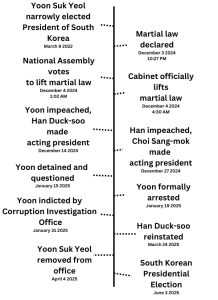On December 14, 2024, just eleven days after his failed declaration of martial law, South Korean President Yoon Suk Yeol was impeached by the National Assembly, and the fate of his career and the future of Korean leadership were left in uncertainty.
 Yoon served as president from 2022 to 2025, but his power was suspended starting on December 14. Though he wasn’t acting president, Yoon still technically held office until April 4th, when the Constitutional Court unanimously upheld his impeachment, ending his presidential term.
Yoon served as president from 2022 to 2025, but his power was suspended starting on December 14. Though he wasn’t acting president, Yoon still technically held office until April 4th, when the Constitutional Court unanimously upheld his impeachment, ending his presidential term.
Yoon was originally replaced with Han Duck-soo, who was impeached on December 27th, making Independent politician Choi Sang-mok acting president.
Choi served as acting president and prime minister until March 24th, 2025, when the Constitutional Court voted to reject the impeachment of Han, restoring his position of acting president and prime minister.
Korean law states that if a president is impeached, a presidential election will occur no more than sixty days after the sitting president is removed. In accordance with this law, the date of the upcoming election has been set to June 3rd.
Following Yoon’s removal from office, several figures have announced their candidacy, including former Democratic Party leader Lee Jae-myung, tech entrepreneur and People’s Power Party (PPP) lawmaker Ahn Cheol-soo, and Lee Jung-hyun, former leader of the now defunct far right Liberty Korea party.
South Korea requires presidential candidates to resign from their public office positions at least thirty days before an election, and the deadline to register as a candidate is May 12. Since Yoon’s impeachment, several members of the government have resigned and are expected to announce their candidacy including former Labor minister Kim Moon-soo and former Gyeonggi governor Kim Dong-yeon.